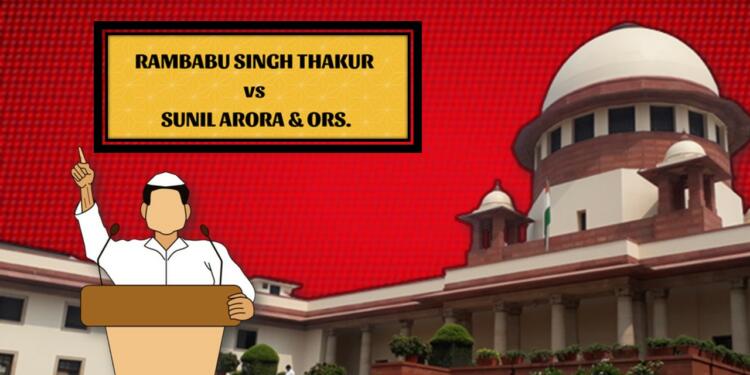Rambabu Singh Thakur vs Sunil Arora Case: The right to ‘know the antecedents of political candidates’ as prescribed under Section 33A and 125 of the Representation of People Act, 1951 empowers the populace with the right to form an informed choice of their leaders. On the contrary, the non-compliance of the established norms has led to an influx of criminals in the political milieu of the nation.
The issue pertaining to criminalisation of politics was taken up by the Supreme Court in the historic judgment of Rambabu Singh Thakur vs Sunil Arora.
Sorry state of Parliament
The magnanimity of the menace of criminalisation of politics can be highlighted from the fact that out of the 539 candidates elected to the Lok Sabha in 2019, 43% elected representatives had criminal antecedents against them. In addition, another 29% faced serious criminal charges including cases of rape, murder, attempt to murder, kidnapping, crimes against women amongst others.
The sorry state of affairs owing to criminalization of politics can be depicted from the fact that the chances of winning for a candidate with criminal records stood at 15.5% whereas, that of a candidate with clean record was mere 4.7%. The growing rate of criminalisation of the Parliament forced the Apex Court to carry out moral policing and intervene in the political realm in the Rambabu Singh Thakur vs Sunil Arora Case.
Also read: Indian IT Act must be amended to curb the excess of big corporations
The instant case was initiated on February 13th 2020, after various litigants approached the Apex Court against the Election Commission of India for not monitoring whether political parties were complying with the directives of the 2018 verdict of Public Interest Foundation. The said contempt petition that arose out of an Electoral Disqualification case dispute took into consideration the all important issue pertaining to the criminalization of politics.
Further, the Rambabu Singh Thakur vs Sunil Arora Case brought to the notice of the Apex Court the alarming upsurge rate of criminals in politics. Evidently, the petition points out how the menace adversely affects the informed voting mandate of the RPA Act owing to lack of statistical data and ineffective law enforcement mechanism.
Also read: Money Bill: All the times, Aadhaar was discussed in Supreme Court
Prominent issue before the Apex Court
The 3-Judge Bench comprising Justice Rohinton Fali Nariman, Justice S. Ravindra Bhat and Justice V. Ramasubramanian, focused their attention on three prominent issues, namely, whether the Supreme Court of India can restrict candidates having criminal background from participating in the Elections?
In addition, whether by making additional laws can the apex court restrain the membership of parliament exceeding Article 102 (a) to Article 102 (e)? Lastly, whether the Supreme Court of India is empowered to issue guidelines under Article 142 and Article 129 of Constitution to prevent said politicians from participating in elections?
Also read: Swapnil Tiwari Vs Union of India: The case which began Live Proceedings
Dictum of the Apex Court
The Apex Court had in the previous case of Public Interest Foundation v. Union of India, had issued a ‘five-point guideline’ to tackle the aggregating criminalization of politics but even the progressive judgment, the law enforcement mechanism failed to curtail the upsurge in criminalization of the Parliament.
Therefore, the Supreme Court in the Rambabu Singh Thakur vs Sunil Arora Case issued six additional guidelines in this judgment by exercising its powers under Articles 129 and Article 142. The additional directives are summarized as follows; firstly, it stated that every political party both at the Centre and State level should be under the compulsion to upload detailed information of their candidates having criminal cases, and specifying reasons for their appointment over other people having no criminal background.
Secondly, the reasons for appointment stated must comprise of their achievements and qualifications, and not merely pointing out better chances to win from a particular sector.
Also read: Right to be Forgotten is a fundamental right
Thirdly, it should be mandatory for every political party to publish such information in one English newspaper and one vernacular newspaper besides their social media handles. Fourthly, such details as mentioned in points 1 to 3 must be published within 48 hours after a candidate is elected, or before two weeks of filing of nominations (whichever comes earlier).
Fifthly, once such a candidate is selected, the concerned political party should send a report of compliance to the Election Commission within a time period of 72 hours.
Lastly, in Rambabu Singh Thakur vs Sunil Arora Case the concerned political party fails to submit a report of compliance within the stipulated time, it is the duty of the Election Commission to bring such non-compliance to the notice of the Supreme Court as contempt of its orders and therefore punishable under Article 129.
Also read: The case that gave transgenders the due recognition that they rightfully deserve
So to say, pursuant to the order in Rambabu Singh Thakur, the Election Commission of India (“ECI”) issued a letter to all National and State level recognised political parties asking them to comply with the directions of the Supreme Court, and also issued a new Form C-7 in which the political parties have to publish the reason for selection of candidates with criminal antecedents in addition to all other relevant information.
Also, in Form C-8, the political parties were then to report compliance of the Supreme Court’s order and the directions contained therein within 72 hours of selection of the candidate. However, a crackdown of the criminalization of politics is not an easy nut to crack as the “Bahubali Culture” is prevalent throughout the nation and the populace are accustomed to electing candidates with criminal records.
Support TFI:
Support us to strengthen the ‘Right’ ideology of cultural nationalism by purchasing the best quality garments from TFI-STORE.COM
Also Watch:
https://www.youtube.com/watch?v=6uQft0eiVUI&t=59s




























